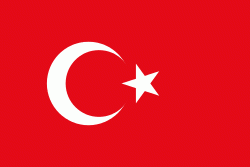Çorlu
Çorlu is a northwestern Turkish city in inland Eastern Thrace that falls under the administration of the Province of Tekirdağ. It is a rapidly growing industrial centre built on flatland located on the motorway Otoyol 3 and off the highway D.100 between Istanbul and Turkey's border with Greece and Bulgaria.
The nearest airport is Tekirdağ-Çorlu Airport (TEQ).
Bronze Age relics have been found in various areas of Thrace including Çorlu and by 1000 BC the area was a Phrygian-Greek colony named Tzirallum, Tzirallun, or Tzirallon (Τζίραλλον). The area was subsequently controlled by the Greeks, Persians, Romans and Byzantines.
During Roman and Byzantine times, the town was referred to as Tzouroulos, or Syrallo. The spelling "Zorolus" is used for the Latinised form of the name of the episcopal see identified with present-day Çorlu in the Catholic Church's list of titular sees. Some writers have identified the Roman town of Caenophrurium (the stronghold of the Caeni and the place where Emperor Aurelian was murdered in 275) with Çorlu, but this seems unlikely as the Antonine Itinerary lists Cenofrurium as two stages and 36 Roman miles (53 kilometre) closer to Byzantium than Tzirallum, and the Tabula Peutingeriana shows the locations separately. There were important Roman and Byzantine fortifications at Caenophrurium, which was a base for controlling large areas of Thrace.
The nearest airport is Tekirdağ-Çorlu Airport (TEQ).
Bronze Age relics have been found in various areas of Thrace including Çorlu and by 1000 BC the area was a Phrygian-Greek colony named Tzirallum, Tzirallun, or Tzirallon (Τζίραλλον). The area was subsequently controlled by the Greeks, Persians, Romans and Byzantines.
During Roman and Byzantine times, the town was referred to as Tzouroulos, or Syrallo. The spelling "Zorolus" is used for the Latinised form of the name of the episcopal see identified with present-day Çorlu in the Catholic Church's list of titular sees. Some writers have identified the Roman town of Caenophrurium (the stronghold of the Caeni and the place where Emperor Aurelian was murdered in 275) with Çorlu, but this seems unlikely as the Antonine Itinerary lists Cenofrurium as two stages and 36 Roman miles (53 kilometre) closer to Byzantium than Tzirallum, and the Tabula Peutingeriana shows the locations separately. There were important Roman and Byzantine fortifications at Caenophrurium, which was a base for controlling large areas of Thrace.
Map - Çorlu
Map
Country - Turkey
 |
|
| Flag of Turkey | |
One of the world's earliest permanently settled regions, present-day Turkey was home to important Neolithic sites like Göbekli Tepe, and was inhabited by ancient civilisations including the Hattians, Hittites, Anatolian peoples, Mycenaean Greeks, Persians and others. Following the conquests of Alexander the Great which started the Hellenistic period, most of the ancient regions in modern Turkey were culturally Hellenised, which continued during the Byzantine era. The Seljuk Turks began migrating in the 11th century, and the Sultanate of Rum ruled Anatolia until the Mongol invasion in 1243, when it disintegrated into small Turkish principalities. Beginning in the late 13th century, the Ottomans united the principalities and conquered the Balkans, and the Turkification of Anatolia increased during the Ottoman period. After Mehmed II conquered Constantinople (Istanbul) in 1453, Ottoman expansion continued under Selim I. During the reign of Suleiman the Magnificent, the Ottoman Empire became a global power. From the late 18th century onwards, the empire's power declined with a gradual loss of territories. Mahmud II started a period of modernisation in the early 19th century. The Young Turk Revolution of 1908 restricted the authority of the Sultan and restored the Ottoman Parliament after a 30-year suspension, ushering the empire into a multi-party period. The 1913 coup d'état put the country under the control of the Three Pashas, who facilitated the Empire's entry into World War I as part of the Central Powers in 1914. During the war, the Ottoman government committed genocides against its Armenian, Greek and Assyrian subjects. After its defeat in the war, the Ottoman Empire was partitioned.
Currency / Language
| ISO | Currency | Symbol | Significant figures |
|---|---|---|---|
| TRY | Turkish lira | ₺ | 2 |
| ISO | Language |
|---|---|
| AV | Avar language |
| AZ | Azerbaijani language |
| KU | Kurdish language |
| TR | Turkish language |















